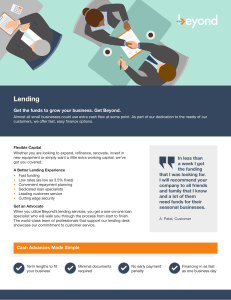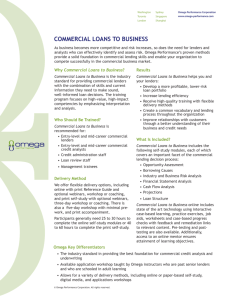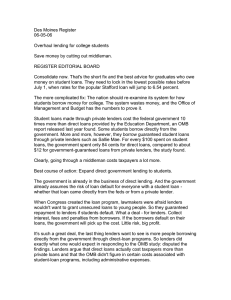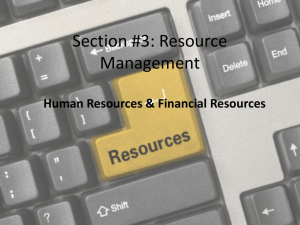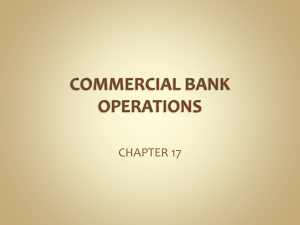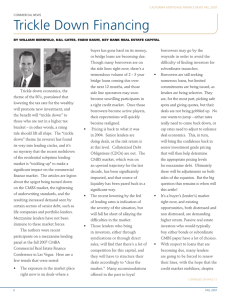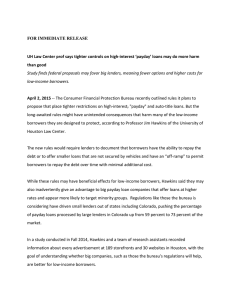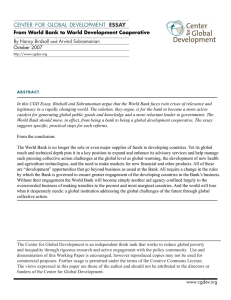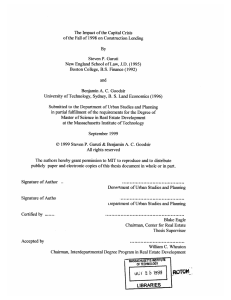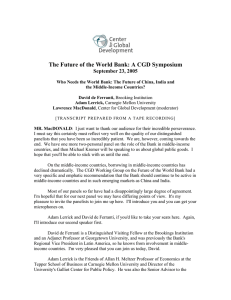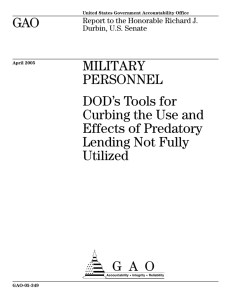SmartMoney.com, NY 10-29-07 Starting Up: How to Avoid the Credit Crunch
advertisement
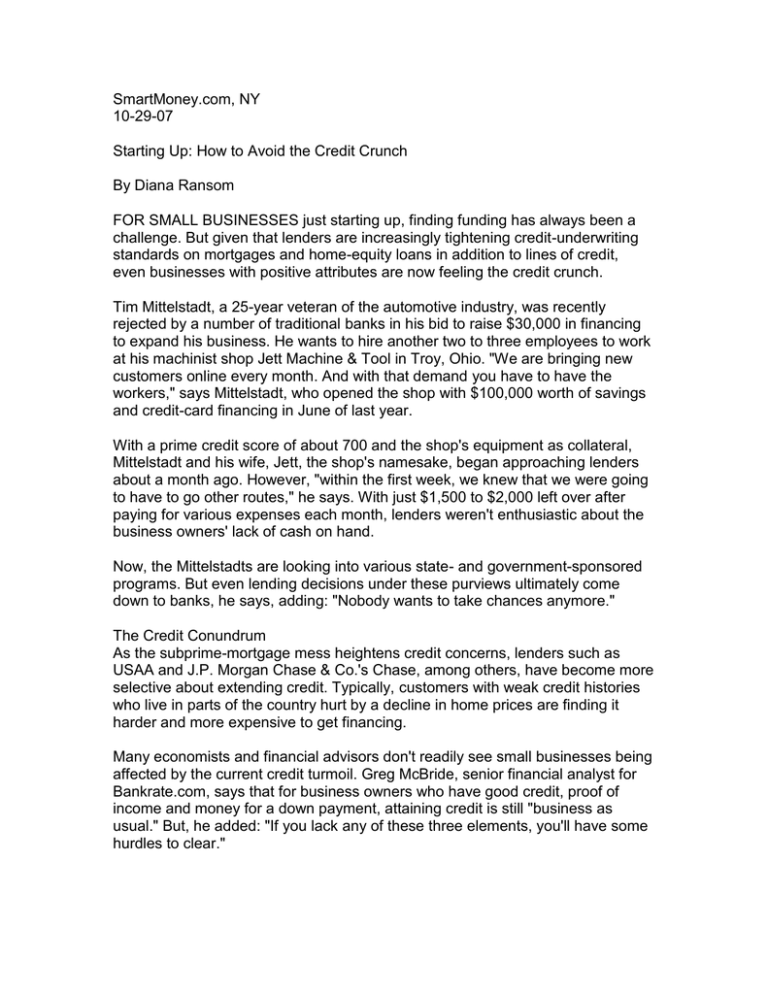
SmartMoney.com, NY 10-29-07 Starting Up: How to Avoid the Credit Crunch By Diana Ransom FOR SMALL BUSINESSES just starting up, finding funding has always been a challenge. But given that lenders are increasingly tightening credit-underwriting standards on mortgages and home-equity loans in addition to lines of credit, even businesses with positive attributes are now feeling the credit crunch. Tim Mittelstadt, a 25-year veteran of the automotive industry, was recently rejected by a number of traditional banks in his bid to raise $30,000 in financing to expand his business. He wants to hire another two to three employees to work at his machinist shop Jett Machine & Tool in Troy, Ohio. "We are bringing new customers online every month. And with that demand you have to have the workers," says Mittelstadt, who opened the shop with $100,000 worth of savings and credit-card financing in June of last year. With a prime credit score of about 700 and the shop's equipment as collateral, Mittelstadt and his wife, Jett, the shop's namesake, began approaching lenders about a month ago. However, "within the first week, we knew that we were going to have to go other routes," he says. With just $1,500 to $2,000 left over after paying for various expenses each month, lenders weren't enthusiastic about the business owners' lack of cash on hand. Now, the Mittelstadts are looking into various state- and government-sponsored programs. But even lending decisions under these purviews ultimately come down to banks, he says, adding: "Nobody wants to take chances anymore." The Credit Conundrum As the subprime-mortgage mess heightens credit concerns, lenders such as USAA and J.P. Morgan Chase & Co.'s Chase, among others, have become more selective about extending credit. Typically, customers with weak credit histories who live in parts of the country hurt by a decline in home prices are finding it harder and more expensive to get financing. Many economists and financial advisors don't readily see small businesses being affected by the current credit turmoil. Greg McBride, senior financial analyst for Bankrate.com, says that for business owners who have good credit, proof of income and money for a down payment, attaining credit is still "business as usual." But, he added: "If you lack any of these three elements, you'll have some hurdles to clear." Curtis Arnold, founder of CardRatings.com, however, thinks issuers may soon increase annual percentage rates on various credit-card offerings in order to compensate for the next interest rate cut, which many expect to occur this week after the Fed meets on Tuesday and Wednesday. In a bid to mollify some of the adverse effects of the credit crunch, the Federal Reserve already reduced its key short-term rate by half a point to 4.75% last month. Howard Van Auken, a management professor who specializes in small-firm financing at Iowa State University, is particularly troubled by the difficulty some business owners are having raising money. "A lack of capital is typically one of the major reasons why smaller companies go bankrupt," he says. Many businesses run into cash-flow problems this time of year, when they need to pay a substantial amount upfront for holiday merchandise. Business owners "have this huge demand for money with no revenue," which forces many to seek out more costly alternatives, Van Auken says. Financing Alternatives Credit Unions might be a good alternative source of funding as about 25% now offer to make business loans, says Bill Hampel, chief economist at the Credit Union National Association, a trade group. Additionally, he says, "some banks may not be willing to give a loan below a certain size whereas credit unions are more likely to make smaller loans." According to a Treasury Department study of credit-union business lending, 59% of credit-union loans made for business purposes were in the amount of $50,000 or less. "The underwriting criteria [at credit unions] are similar to banks," says Hampel. "But I have not had reports from credit unions that they have tightened their standards." Business owners might also try tapping peer-to-peer lending networks such as Prosper.com. Borrowers list how much they need and details about their business while strangers with cash on hand make loans at their choosing. At Prosper, a San Francisco-based web site that seeks to connect borrowers with lenders, users can make loans for as little as $50. Formerly the sole territory of Facebook users, Lending Club now allows all consumers to make loans. Virgin Money specializes in structuring transactions between friends, family members and associates. Another lesser-known option: Factoring, which occurs when one business sells its invoices or accounts receivable to a firm that specializes in collecting payments, can help some businesses free up cash flow. "Factors," or firms that purchase a business's customers' debt, will first check the creditworthiness of the billed client, not that of the business owner. Once the company's credit checks out, you receive about 70% to 90% of the invoiced amount upfront. This option is best suited for businesses that regularly collect payments from customers. Additionally, says John Millman, president of Sterling National Bank in New York which offers factoring services: "Most factors would be unable to finance a client whose aggregate billings were less than $1 million." While you don't have to send every transaction through to the factor, many firms require a minimum number of transactions each month. Also, you'll usually have to sign up for one to two years. Lastly, investing in a business via a person's self-directed individual retirement account is another possibility, though, it can be problematic because of rules involving self-dealing, says Barry C. Picker, a financial planner and accountant in New York. A person who considers this option should check with an advisor or accountant to avoid the risks of an Internal Revenue Service challenge. (In general, the IRS frowns upon using money for your future retirement for current needs.) There may be some exceptions for limited liability and other corporations but you likely have to get a private letter ruling from the Internal Revenue Service or an exemption from the Department of Labor.
